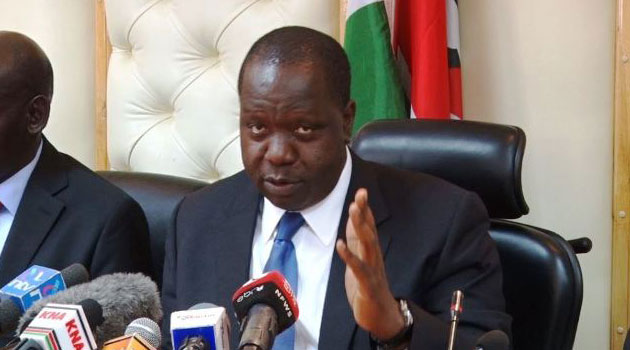Business
Chinese Traders at Gikomba To Be Deported, CS Matiang’i

The Immigration Department has been given a directive by the Interior Cabinet Secretary Fred Matiang’ i to deport small-scale foreign traders.
The order will mainly affect the Chinese traders who engage in the importation of goods and wholesale and retail trading that have set up shop in Kamukunji, Gikomba and Nyamakima markets.
“We do not have a classification of foreign investors coming into the country to conduct trade or to hawk. I have already directed that those in Gikomba be escorted to the airport tomorrow to ensure they take supper in their homes,” said Dr. Matiang’ i when speaking yesterday in Nakuru.
Foreigners have found it easy to establish businesses in the country due to slack immigration laws that include a Sh10 million requirement for the acquisition of an investment certificate.
As stipulated in the Investment Promotion Act 2004, foreign investment must be of benefit to the country through promoting the acquisition of new skills and use of local resources.
“An applicant shall be entitled to an investment certificate if— the amount to be invested by a foreign investor is at least one hundred thousand United States of America dollars or the equivalent in any currency; creates employment for Kenyans, leads to acquisition of new skills or technology for Kenyans or a transfer of technology to Kenya and any other factors that the Authority considers beneficial to Kenya,” says Section 4 of the Act.
Contrary to this, the Chinese traders hire Chinese staff to work at their businesses while employing Kenyans to do menial tasks such as ferrying of goods.
Moses Ikara, the chief executive of the Kenya Investment Authority, said in an interview on Wednesday that the minimum sum required for foreign investors to acquire an investment certificate is currently under review.
“We are implementing the Kenya Investment Policy that was recently approved by the Cabinet and part of the plan is to set different minimums in each sector that a foreign investor must have to be allowed to set up shop in the country because the current blanket requirement of Sh10 million may be too little especially in heavy capital sectors like real estate. We will also ensure that certain sectors are just reserved for locals so that we protect them,” said Dr. Ikiara.
The traders sell various products in the markets they are based in including utensils and electric cables in Kamukunji and Nyamakima while in Gikomba their main products include second-hand shoes and clothes imported from China.
According to Alexander Muteshi, the Director of Immigration Services, other foreign nationals operating illegally in Kenya, as well as those with fake work permits, will also be affected.
“Any foreigner engaging in petty business is not an investor. Those involved in petty jobs may not be holding genuine work permits because no permit can be issued for those kind of jobs unless they are fake permits,” said Mr. Muteshi.









